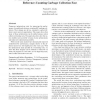37 search results - page 1 / 8 » Worst-Case Analysis of Heap Allocations |
ISOLA
2010
Springer
13 years 5 months ago
2010
Springer
In object oriented languages, dynamic memory allocation is a fundamental concept. When using such a language in hard real-time systems, it becomes important to bound both the worst...
CASC
2007
Springer
14 years 1 months ago
2007
Springer
A common way of implementing multivariate polynomial multiplication and division is to represent polynomials as linked lists of terms sorted in a term ordering and to use repeated ...
IWMM
2007
Springer
14 years 1 months ago
2007
Springer
Numerous optimizations exist for improving the performance of nondeferred reference-counting (RC) garbage collection. Their designs are ad hoc, intended to exploit different count...
CCS
2010
ACM
13 years 7 months ago
2010
ACM
Heap-based attacks depend on a combination of memory management errors and an exploitable memory allocator. We analyze a range of widely-deployed memory allocators, including thos...
IWMM
2007
Springer
14 years 1 months ago
2007
Springer
This article presents a heap space analysis for (sequential) Java bytecode. The analysis generates heap space cost relations which define at compile-time the heap consumption of ...

